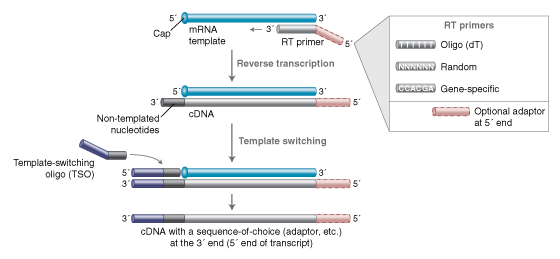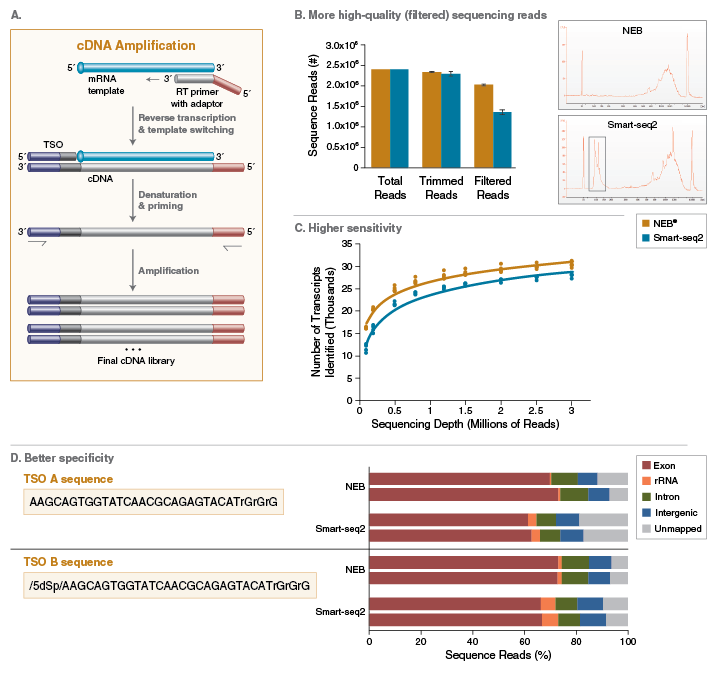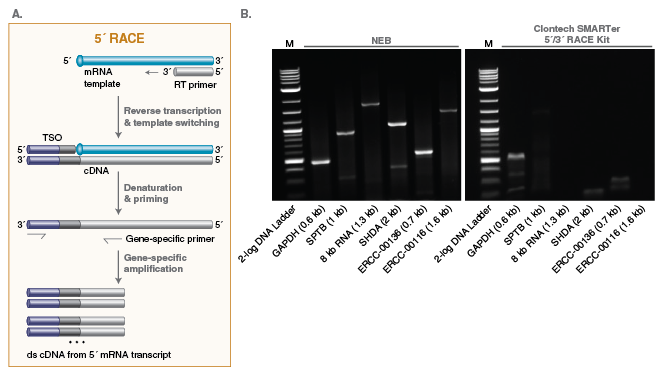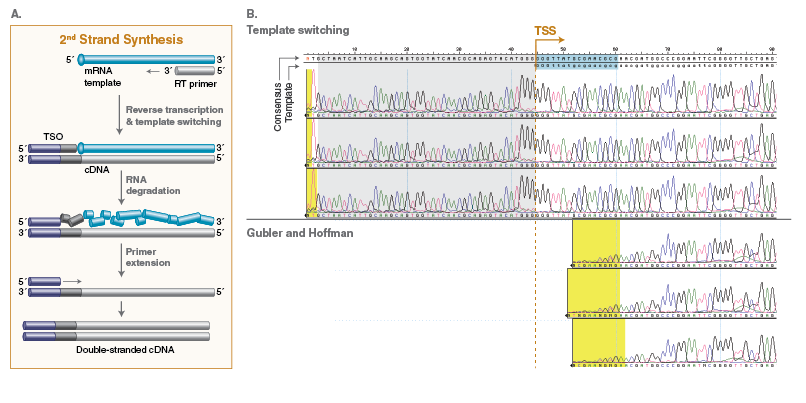上海金畔生物科技有限公司代理New England Biolabs(NEB)酶试剂全线产品,欢迎访问官网了解更多产品信息和订购。
Template Switching RT Enzyme Mix
The Template Switching RT Enzyme Mix and accompanying reaction buffer enable efficient template switching activity in a reverse transcription reaction. The mix contains a unique RT and Murine RNase Inhibitor. Unlike competitor RT products, no additives (such as PEG or betaine) are required for optimal performance, simplifying reaction setup. In conjunction with a template switching oligo (TSO), cDNA is synthesized with a known sequence of choice attached to the 3′ end. The resulting cDNA can be amplified by PCR or serve as template for 5′ RACE (rapid amplification of cDNA ends) or 2nd strand cDNA synthesis.
- Prepare RNA-seq libraries from extremely low input: single cells/nuclei or 2 pg of total RNA.
- Perform 5′ RACE from as low as 10 ng total RNA.
- Low background for RNA-seq or 5′ RACE
- Enzyme mix contains Murine RNase Inhibitor, no additives necessary
- Compatible with various template switching oligos (TSOs), RT primers, and DNA polymerases for full length cDNA amplification
- Enjoy faster protocols as compared to alternative RNA-seq methods (eg. Smart-Seq®)

产品信息


B-D. cDNA libraries were generated from 10 pg of Universal Human Reference (UHR) RNA (Agilent®) with ERCC RNA Spike-In Mix I (Thermo Fisher Scientific®) using NEB Template Switching RT Enzyme Mix or the Smart-seq2 method as described in Picelli, S. et al. (2014). Nat. Protoc. 9, 171-81. Each cDNA library was made into Illumina libraries using the NEBNext® Ultra™ II FS DNA Library Prep Kit (NEB #E7805) and sequenced using 2×75 cycles on a Nextseq 500. The sequencing reads were down-sampled to 2×1.2 million reads unless otherwise indicated, adapter trimmed and filtered with Prinseq. B. Shown are total down-sampled reads (Total reads), reads after adaptor trimming (Trimmed reads) and reads passing Prinseq filter (Filtered reads). Insets shown are example Bioanalyzer results for cDNA libraries made by each method. Non-specific products are highlighted in the dotted frame. C. Filtered reads were aligned to GENCODE 28 and ERCC transcripts using Salmon. Dots indicate the number of transcripts with TPM (Transcripts per million) ≥1 detected from each library as a function of sequencing depth. D. Filtered reads were aligned to hg19 Human Reference Genome using Hisat 2.0.7 and RNA-seq metrics were calculated using Picard SAM/BAM RNA Seq Metrics tools. Shown are percentage of mapped reads distributed to exons (red), rRNAs (orange), introns (green), intergenic region (blue) and reads that cannot be mapped to the reference (gray).

B. Agarose gel analysis of 5′ RACE products for various RNA targets using the NEB Template Switching RT Enzyme Mix 5′ RACE protocol (left) or Clontech SMARTer 5′/3′ RACE Kit (right). Input included 1 µg of Jurkat total RNA, 10 pg of 8 kb synthetic RNA and 10 ng of ERCC RNA Mix 1 to evaluate the performance as a function of transcript length and copy number. For the NEB reaction, oligo (dT)40 VN was used as an RT primer and GCTAATCATTGCAAGCAGTGGTATCAACGCAGAGTACATrGrGrG as the TSO, with the TSO-specific PCR primer underlined. The same internal gene-specific PCR primer was used for both methods. Target names and expected sizes are as indicated.

B. 1 kb synthetic RNA was used as template and poly(dT)40 VN was used as RT primer for 1st strand cDNA synthesis. Three independent experiments were performed for 2nd strand cDNA synthesis using either the template switching-mediated method or the method as described by Gubler. R and Hoffman, BJ. (1983) Gene, 25, 263-269. The resulting ds cDNA products were subject to Sanger Sequencing using a reverse primer to sequence the cDNA 2nd strand. The template sequence with the transcription start site (TSS) and the alignment consensus sequence are indicated. The TSO sequence added to the cDNA end is highlighted in gray. Sequences not reliably detected from the Gubler and Hoffman method are highlighted in blue. Bases with low confidence calls are highlighted in yellow.
- 产品类别:
- cDNA Synthesis & Reverse Transcriptases Products,
- PCR, qPCR & Amplification Technologies Products
- 应用:
- cDNA Synthesis,
- RNA Analysis
- 产品组分信息
产品组分信息
本产品提供以下试剂或组分:
NEB # 名称 组分货号 储存温度 数量 浓度 -
M0466S -20 Template Switching RT Enzyme Mix M0466SVIAL -20 1 x 0.02 ml 10 X Template Switching RT Buffer B0466SVIAL -20 1 x 0.5 ml 4 X
-
M0466L -20 Template Switching RT Enzyme Mix M0466LVIAL -20 1 x 0.1 ml 10 X Template Switching RT Buffer B0466SVIAL -20 1 x 0.5 ml 4 X
-
- 特性和用法
操作说明、说明书 & 用法
- 操作说明
- cDNA Synthesis and Amplification Protocol using the Template Switching RT Enzyme Mix (NEB #M0466)
- 2nd Strand cDNA Synthesis Protocol using the Template Switching RT Enzyme Mix (NEB #M0466)
- 5’ RACE Protocol using the Template Switching RT Enzyme Mix (NEB #M0466)
FAQs & 问题解决指南
- FAQs
- Do I need to add RNase Inhibitor to the RT reaction when using the Template Switching RT Enzyme Mix?
- Numerous publications describe the addition of various additives (e.g., betaine and PEG) to improve template switching. Can I add any of those to my reaction?
- Is the Template Switching RT Enzyme Mix compatible with RT primers with degenerate bases for cDNA synthesis and amplification, as described in the mcSCRB method [1]?
- What type of template switching oligos (TSOs) are compatible with the Template Switching RT Enzyme Mix?
- Can I use the Template Switching RT Enzyme Mix for regular RT reactions?
- What is the efficiency of template switching when using the Template Switching RT Enzyme Mix?
- Does the Template Switching RT Enzyme Mix work for prokaryotic RNA?
- Does the Template Switching RT Enzyme Mix work for fragmented RNA?
- What type of RT primers can be used with the Template Switching RT Enzyme Mix?
- Can I reduce the RT reaction time?
引用 & 技术文献
- 引用文献
产品引用文献查找工具
 Powered by Bioz See more details on Bioz
Powered by Bioz See more details on Bioz
质控、安全 & 法规
- 质控分析
每一新批次的 NEB 产品都要经过质控,以满足指定的质量标准,对特定产品的质量标准和每一批次的检测数据可以通过产品说明表格、COA、产品信息卡或者产品手册进行查阅或下载。关于 NEB 产品质控的详细信息,可从此处查阅。
- 产品说明与变更通知
产品说明与变更通知
产品说明表包含产品的储存温度、有效期和规格,这些文件的命名规则如下:[货号]_[规格]_[版本]
- M0466S_L_v1
- CoA
CoA 文件包含单个批次产品的储存温度、有效期和质控,这些文件的命名规则如下: [货号]_[规格]_[版本]_[Lot#]
- M0466L_v1_10034964
- M0466S_v1_10034965
- M0466L_v1_10054948
- M0466L_v1_10057544
- M0466L_v1_10059883
- M0466S_v1_10060350
- M0466S_v1_10063915
- M0466L_v1_10062116
- M0466L_v1_10070692
- M0466L_v1_10073395
- M0466L_v1_10073795
- M0466L_v1_10077107
- M0466S_v1_10073396
- M0466S_v1_10083313
- M0466L_v1_10084018
- M0466S_v1_10086688
- M0466L_v1_10088966
- M0466S_v1_10094233
- M0466L_v1_10094234
- M0466S_v1_10102585
- M0466S_v1_10105164
- M0466L_v1_10110683
- M0466S_v1_10118243
- M0466L_v1_10120363
- M0466L_v1_10122825
- M0466S_v1_10131915
- M0466S_v1_10135006
- M0466L_v1_10140691
- M0466S_v1_10139835
- M0466L_v1_10152833
- M0466S_v1_10154959
- M0466L_v1_10155310
- M0466S_v1_10156585
- SDS
以下 SDS 文件可以帮助您安全地使用该产品
-
Template Switching RT Enzyme Mix
-
Template Switching RT Buffer
-
